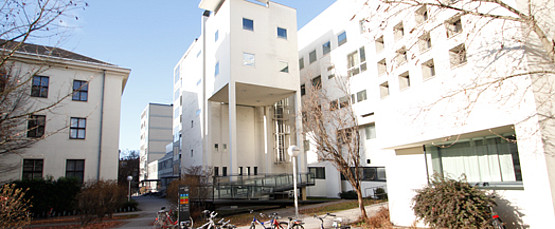FWF/CDG Project PIR 27
Mathematical methods for motion-aware medical imaging
The proposed project is settled on the interface of basic and application-driven mathematical and medical engineering research and aims at laying foundations for the transfer of novel mathematical methods for motion-aware tomographic imaging into commercial applications. Tomographic devices, in particular magnetic resonance imaging (MRI), constitute essential diagnostic tools of modern medicine.
They allow for the non-invasive visualization of organs and tissue inside the body, delivering valuable information, e.g., for early-stage diagnosis as well as treatment planning. The key ingredient that makes tomography possible is the reconstruction of an image of the interior by just measuring indirectly outside this object. This task poses a mathematical problem whose solution is realized in each tomographic device.
The research in this project addresses one of the major current challenges for present tomographic devices: The fast and efficient reconstruction of dynamics and patient motion. Currently, physical speed limits in the acquisition of data often prevent such motion-aware imaging. In particular, for MRI, patient movement during acquisition such as breathing causes severe artifacts in the reconstructions, making the repetition of measurements necessary. More importantly, there are many situations where one aims at imaging dynamics for diagnostic purposes, such as pumping and blood-flow motion of the heart. Due to these dynamics being faster than the measurement device, their imaging is presently only possible accepting serious limitations such a long breath-holds, high scan times and patient discomfort. As physical limits are involved, technological progress is meeting its limits and further improvements can only be achieved with more sophisticated image reconstruction techniques. To this aim, mathematical basic research is indispensable, bearing great potential to significantly extend current possibilities in medical imaging. In this respect, with progress in the mathematical theory of optimal transport, new techniques recently emerged that show promise for application in motion-aware medical imaging.
It is the goal of this project to carry out the necessary steps for bringing these newly-emerged mathematical techniques to concrete application in motion-aware MRI, building on the previous work and experience of the participating research groups. It centers around a novel framework for jointly estimating motion and image content that bears the potential to overcome many practical limitations of existing methods as well as to open new horizons for diagnostic imaging. In a joint effort of the mathematical and medical engineering project partners, the proposed approach shall be developed up to a level where it can be readily applied in clinical practice and potentially utilized in clinical research studies. Its eventual realization in tomographic devices and clinical routine, however, can not be achieved without cooperation partners from industry. The project shall therefore in particular lay the basis for such corporate partnerships in medical-engineering and tomographic-imaging-related business areas.
Publications
- K. Bredies, M. Carioni, S. Fanzon, F. Romero.
A generalized conditional gradient method for dynamic inverse problems with optimal transport regularization.
Foundations of Computational Mathematics, 2022.
(Open access, preprint arXiv:2012.11706)
- K. Bredies, M. Carioni, S. Fanzon, D. Walter.
Linear convergence of accelerated generalized conditional gradient methods.
Submitted for publication, 2021.
(Preprint arXiv:2110.06756)
- K. Bredies, M. Carioni, S. Fanzon and F. Romero.
On the extremal points of the ball of the Benamou-Brenier energy.
Bulletin of the London Mathematical Society, 53(5):1436-1452, 2021.
(Open access, preprint arXiv:1907.11589)
- K. Bredies, S. Fanzon.
An optimal transport approach for solving dynamic inverse problems in spaces of measures.
ESAIM: Mathematical Modelling and Numerical Analysis, 54(6):2351–2382, 2020.
(Open access, preprint arXiv:1901.10162)
- K. Bredies, M. Carioni, S. Fanzon.
A superposition principle for the inhomogeneous continuity equation with Hellinger–Kantorovich-regular coefficients.
Submitted for publication, 2020.
(preprint arXiv:2007.06964)
Activities
- Cambridge Image Analysis Seminar
Cambridge, January 2020
- OMS Workshop
Toulouse, November 2019
- MAGA Workshop
Orsay (Paris), November 2019
- Chemnitz Symposium on Inverse Problems
Frankfurt, September 2019
- ICCOPT
Berlin, August 2019
- Research and Development Round Table
Graz, October 2017
- International Partnering Day
Graz, September 2017
